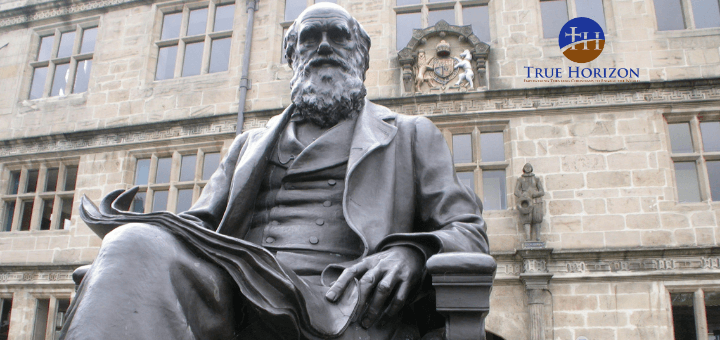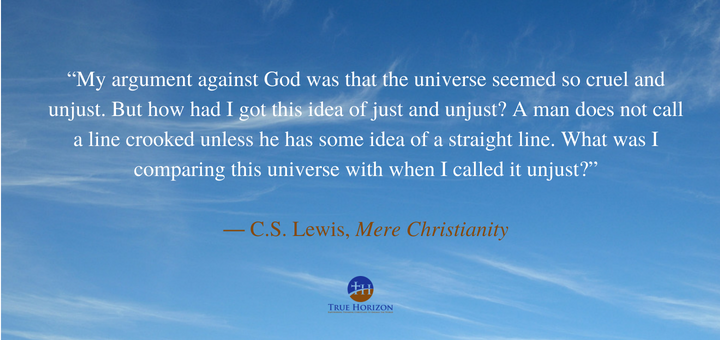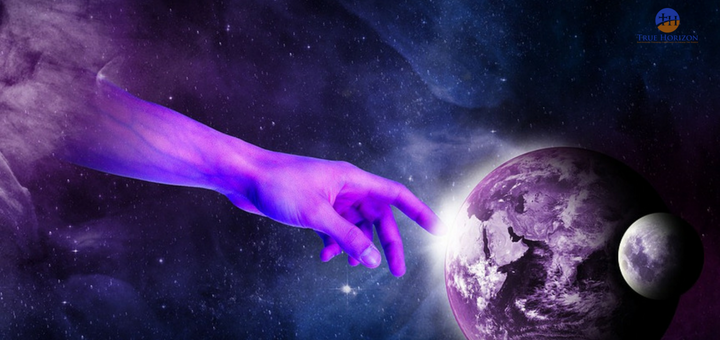On The Origin Of Darwinism
February 12th is Charles Darwin’s birthday. There aren’t many individuals who have had as much influence on the world as this one man. He is the godfather of Theory of Evolution and the Materialistic worldview that embraces it. And, for that reason, he is the target of a lot of ire from religious believers. I disagree with almost everything Darwin represents. But I am also a proponent of attacking ideas, not persons. We shouldn’t blame Darwin for what contemporary science has done with his Theory. I am no scientist but I greatly appreciate the scientific enterprise and the experts who practice it. There is no denying that Charles Darwin was a brilliant man and an accomplished scientist. And I believe he was sincerely seeking to find the truth through his scientific investigations. But when you consider his background, it’s hard to deny that his life experiences didn’t taint his ability to examine things objectively. Charity demands that we should cut the guy some slack. If you know anything about the origin of Darwinism, I hope you’re compelled to agree.
Before Darwinism
Charles Darwin was brought up in a non-conformist, Unitarian, “freethinking” family. That alone implies that he developed an unorthodox view of God in general and of Christianity in particular. But he also lived at a time when the modern Enlightenment mindset was exploding in popularity. Science and technology were changing the world rapidly. And God was turning into a passé answer to any question. Crazy as it sounds, Darwin began his pursuit of higher education at Cambridge University where he studied to become an Anglican clergyman. And he doesn’t seem to have doubted the literal truth of the Bible as an authoritative source for morality while he was there.
At that point, Darwin wasn’t an atheist. In fact, he claimed that “an agnostic would be the more correct description of my state of mind.” He thought of religion as community survival strategy. But he still believed that God was the ultimate moral lawgiver. Though he was suspicious of the Bible’s historical reliability, it doesn’t seem appropriate to label him as an anti-theistic monster. So, I don’t.
The Perennial Problem of Evil
All that said, I do believe Darwin suffered from a serious case of The-God-I-Believe-In-Wouldn’t-Do-It-That-Way mentality. That is, and always has been, the most common objection to God’s existence. Like many before and after him, Charles Darwin simply could not handle the Problem of Evil. He couldn’t accept the idea that an omnipotent, omni-benevolent Deity would allow all the pain and suffering he saw in the world. For instance, Darwin couldn’t wrap his head around the idea that God would create a wasp that stung a caterpillar to paralyze it, and then use it as an incubator and food source for the wasp’s own eggs. What kind of demented deity would design a world like that?
The Problem Gets Personal
Charles Darwin had real trouble reconciling his view of science with his view of morality. And then he experienced one of the most horrific tragedies any parent could face. His ten year-old little girl, Annie, died. The pain of that experience followed Darwin for the rest of his life. And it’s palpable. You can feel it in a passage of Wordsworth’s* poetry that was found marked in one of Darwin’s favorite books after he died …
Surprised by joy – impatient as the Wind
I turned to share the transport – Oh! With whom
But thee, deep buried in the silent tomb,
That spot which no vicissitude can find?
Love, faithful love, recalled thee to my mind –
But how could I forget thee? Through what power,
Even for the least division of an hour,
Have I been so beguiled as to be blind
To my most grievous loss? – That thought’s return
Was the worst pang that sorrow ever bore,
Save one, one only, when I stood forlorn,
Knowing my heart’s best treasure was no more;
That neither present time, nor years unborn
Could to my sight that heavenly face restore.
Annie died in 1851. And from that point forward, Charles Darwin labored to disassociate God from the title, “Grand Designer.” In his mind, no loving God would design a world that had been so cruel. His goal was to replace God with some natural explanation for life. He wrote On The Origin Of Species in 1859.
Reaction To Pain
How would any of us respond to the pain of losing our own child? It’s the kind of thing that makes emotion smother reason. Charles Darwin was a very smart man. But the pain and suffering that accompanies life was too much for him. I’m not saying it completely explains his thinking. But it would be hard to deny its impact. That’s why I think we should be charitable to the man. Instead of demonizing him, we should extend him grace. There is no doubt that later atheists and God-haters have used what has come to be known as “Darwinism” to do away with God. But that doesn’t make Charles Darwin a God-hater.
Maybe Darwin’s genuine revulsion toward the reality of evil led him to explain it away — to relieve God of the moral responsibility he would incur for allowing it. Maybe Darwin respected God too much to lay the blame for pain and suffering on Him. Religious skeptics are quick to claim that God is just a psychological crutch for weak-minded people. So, if psychology can explain why some people believe in God, maybe it can also explain why some people don’t believe in God.
Either way, how about we stop focusing on persons (no matter what their claims) and start focusing on evidence.
Darwin’s Ignorance
When it comes to evidence, Charles Darwin was operating at a severe disadvantage from us. He thought the cell was a glob of gelatin. No one had discovered the intricate details of the cellular machinery or knew that it operates as a highly designed factory.
Darwin didn’t know about DNA and the massive amount of information it holds. He had no clue that DNA is a digital information system — the kind of thing that doesn’t originate from an unguided process.
He postulated that life could have begun spontaneously in some “warm little pond.” It would be nearly 150 years before origin of life scientists would discover the utter intractability of the questions and problems surrounding the issue of how life began.
Charles Darwin knew none of that. He told a story. A really compelling story. But the evidence we have today undermines the story. Organisms adapt to their surroundings. Nobody doubts that. But that doesn’t explain where life came from or the nature of the process that perpetuates it. It certainly doesn’t even pretend to explain human consciousness.
Doubting Darwinism
So let’s play fair. Maybe Darwin did manufacture his theory because of a psychological inability to deal with the pain he saw in the world. But that doesn’t make it false. We all have to admit that God allowing evil is a tough pill to swallow. But that’s a different question.
Let’s just evaluate Darwinism on scientific grounds. That’ where we differ. The evidence just doesn’t support the case that’s been made in his name. We are to be respecters of men, but not of ideas — especially ideas that are both harmful and untrue. I prefer to disagree with Darwinism and leave poor Charles Darwin alone.
*When I originally posted this, I wrongly attributed the poem to Milton. It is, in fact, the work of Wordsworth. I apologize for the error and have corrected it above.




Bob: Thanks for your article on Charles Darwin. I generally agree with your sentiment about the man vs. the theory. In this case, however there is a lot more on the personal side of the man, and how his theory has been used as a motivator, for so much evil propagated in the 20th and 21st centuries. He himself held truly racist views, not the one size fits all, racist accusations that we see leveled today. He was a large influence on Marx, as well as Hitler, and Sanger. The latter being two of the most prodigios mass killers in history., and the former being equally responsible, if not directly for massive human misery. It amazes me that with his history of animal torture, mental disorders, and racist views, he his so venerated. Given this, I tend to hold him in very low regard, and consider him to be perhaps, the most negative influence on society in the last two centuries.
I wouldn’t argue any of your points, Jerry. You don’t even have to get past the subtitle of his most famous work: “On the Origin of Species by Means of Natural Selection, or The Preservation of Favoured Races in the Struggle for Life,” to see the latent racism in Darwin’s thinking. The Nazi’s used it happily to justify their own work. Richard Weikart has written a fantastic account of that in his: “From Darwin to Hitler: Evolutionary Ethics, Eugenics, and Racism in Germany.”
That said, my reason for writing the piece was to try to be charitable and challenge the origin of Darwinism, not to defend the subsequent conclusions Darwin. I always want to try to attack ideas, not people.
Bob: My reply to your article on Darwin was not intended for you. I knew that you already know all the information I posted. It was for others, who may not be aware of who Darwin was in much more depth. I’ve had the same experience as you when debating atheists, they inevitably equiavaquate on the meaning of evolution. It makes a cogent conversation nearly impossible. Seems like such an obvious difference, but is always meant with denial. I have come to realize it isn’t a lack of evidence for a supernatural creator, but is instead, an overwhelming desire to be one’s own sovereign. Evidence, rationale, common sense, true science, are jettisoned. Only God can open the heart and eyes. Hope retirement is going well. Thanks for your articles, I enjoy them very much. God bless. Jerry
I guess there’s one good thing about the use of “Darwinism” instead of “evolution” (y’know–the word the biologists actually use). I can just ignore the article.
I find when debating evolutionists, it is necessary to delineate between evolution, which is observable, i:e small adaptable changes within the limits of preprogrammed genetic code, and Darwinian evolution that posits immense changes over unfathomable amounts of time, that cross the barrier kind, with seemingly no limits, no purpose, or guidance, which has never been observed.
jerome: Yes, evolution is observable, both in the short term (bacteria resistance to antibiotics or the Lenski experiment) and the long term (changes evident in subsequent layers of fossils). That’s evolution as fact. Evolution as theory is something else, the *explanation* of how it works.
You’re saying that no one has set aside millions of years to observe land animals evolve into whales (to take one of many interesting progressions)? That’s right–people don’t live that long. But that doesn’t mean we can’t have good evidence for it (through fossil layers and DNA, for example).
This post is not meant to ignite a debate about Evolution. And, for that reason, I am not going to take the bait. But I will point out that you are doing what Evolutionists always do … equivocate on the definition of “evolution.”
Yes, bacterial resistance to antibiotics is ONE WAY to demonstrate evolution — adaptation. And, as I stated plainly in the post, no one is debating that. So, we agree. But then you extrapolate that form of “evolution” to be evidence for the emergence of the first life and Universal Common Descent. It’s a classic bait and switch. And that’s the kind of thing one has to ignore in order to swallow the story that can explain everything … and therefore actually explains nothing.
Bob, I have to take issue with you, as to your reference to bacteria experiments. Your comment bolsters my objection to Darwin’s theory. Bacteria can indeed evolve, according to the limits of genetic coding. No further. Geneticists have been using them now for decades, because of the fast reproductive rate. Lots of changes that have occurred, due to “intentionally” introducing mutations. But they are still bacteria, not some other kind of creature. Even with an intelligent agent, purposely applying its will. What layers of fossils are you referring to, as proof of Darwinian evolution occuring? Certainly not the Cambrian explosion? There are no missing links in the fossil record. Darwin himself understood that, and it was a great source of consternation for him, so much so, as it caused him to have great doubt as to his theory. In addition there have been many attempts to alter fossils, in order for them to look transitional. Stephen Jay Gould recognized the fossil record didn’t support Darwin. He posited a 180 degree theory called punctuated equilibrium. If the fossil record supported Darwin, why would there be attempts to falsify, or come up with another completely different theory in order to cling to a naturalistic worldview? https://www.goodreads.com/quotes/7838107-the-extreme-rarity-of-transitional-forms-in-the-fossil-record I’m saying no one has ever observed Darwins theory, and the fossil record does not support it either. Science at its core relies on observation in order to declare something to be a scientific fact. Nothing of the sort has taken place, and yet we have those that declare Darwin’s theory as fact, despite the evidence against it. In addition D.N.A. that Darwin had no knowledge of , is more evidence against his theory. D.N.A. has preprogrammed information that sets limits to what changes can occur. Nothing found, allows changes that would allow a creature morphing into a completely different kind, no matter how much time is posited. Time is not a causal agent, neither is chance.
Exactly, Jerry. Bingo!
Bob:
“I will point out that you are doing what Evolutionists always do … equivocate on the definition of “evolution.””
Equivocate? The experts say that evolution is both a scientific theory and what you observe when studying fossils of different ages. I’m not sure what the problem is.
“But then you extrapolate that form of “evolution” to be evidence for the emergence of the first life and Universal Common Descent.”
Yes, evolution does point to common descent. Michael Behe even agrees with that. But no, abiogenesis is a different story. A successful theory of evolution doesn’t mean that the question of abiogenesis has been figured out.
“in order to swallow the story that can explain everything … and therefore actually explains nothing.”
I marvel at your cockiness. The people who actually understand this stuff (you remember biologists, right?) have reached an overwhelming consensus that the theory of evolution best explains why life is the way it is. If you’re not a biologist, I can’t imagine what makes you think you can reject that.
Bob, if you actually think bacterial resistance to antibiotics is adequate evidence for Universal Common Descent, your point-of-view is not to be taken seriously.
jerome: “Bacteria can indeed evolve, according to the limits of genetic coding. No further.”
I’ve always wondered at Creationists’ accepting bacterial resistance but rejecting speciation. They’ve never explained what force field keeps the mutation and selection contained so that the genetic adaptation doesn’t create new species (or more).
I don’t know if you’re in that group or not, but perhaps you can explain their reasoning either way.
“Geneticists have been using them now for decades, because of the fast reproductive rate. Lots of changes that have occurred, due to “intentionally” introducing mutations. But they are still bacteria, not some other kind of creature.”
So we have the 2-decade-old Lenski experiment and you’re crowing that the bacteria are still bacteria?? No one is surprised by that. They’ve seen speciation, which is all they expected to see. To go from bacteria or archaea to eukaryotes (the kind of cells we have) is thought to have taken hundreds of millions of years. No, no one is surprised that we didn’t see anything this dramatic in the Lenski experiment.
“Even with an intelligent agent, purposely applying its will. What layers of fossils are you referring to, as proof of Darwinian evolution occuring?”
(1) Not proof. Science doesn’t prove things.
(2) The Burgess shale would be one example.
“Certainly not the Cambrian explosion? There are no missing links in the fossil record. Darwin himself understood that, and it was a great source of consternation for him, so much so, as it caused him to have great doubt as to his theory.”
Words cannot express how little interest I have in what Darwin said. No one cares (except Creationists, perhaps). Modern biologists don’t compare their latest hypothesis with the works of the great man to see if they hold up.
“Stephen Jay Gould recognized the fossil record didn’t support Darwin.”
You mean “didn’t support *evolution*”?
I’m surprised at the suggestion that Gould didn’t think that the fossil record supports evolution. Citation please.
Show me a fossil and I’ll show you a transitional fossil.
“we have those that declare Darwin’s theory as fact, despite the evidence against it”
Theories don’t graduate to facts.
Let’s get our scientific knowledge from the consensus of the experts, not religiously motivated sites like the Discovery Institute or AiG.
Bob: “I always want to try to attack ideas, not people.”
Bravo. A good first step would be to talk about evolution, not “Darwinism.” Darwin lived long ago, was a product of his time, and knew little of what modern biologists know. That he made mistakes or was ignorant is true and uninteresting.
Bob P.: “Bob, if you actually think bacterial resistance to antibiotics is adequate evidence for Universal Common Descent”
No, that’s not my opinion. Nor is it what I said.
jerome: “I’ve had the same experience as you when debating atheists, they inevitably equiavaquate on the meaning of evolution.”
But as I’ve explained, evolution as fact and evolution as theory are two different things that are easily distinguished. Evolution is a word in English, and evolution is a theory within biology—not that hard.